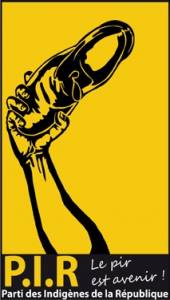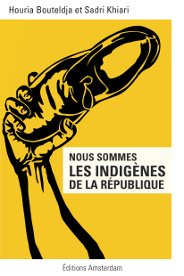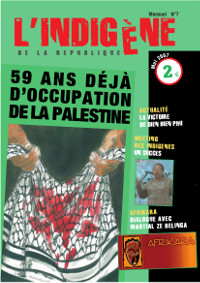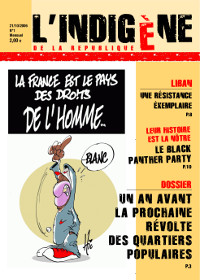Like delighted maneuvering vultures, our accusers jumped at the chance to pin the “moral responsibility” of the attacks on the struggle against islamophobia, because Charlie Hebdo’s drifts towards islamophobia were criticized in a social and political context of unequal treatment of Muslims, a context favourable to all sorts of violence. Some among these accusers are certified islamophobes. In this way they may try to clear their own responsibility, but more importantly they aim to mobilise state repression against our respective and common struggles, or in other words they aim to silence them, in the name of a selective “freedom of expression”, one which is strictly subordinate to their privileges. We witnessed this selectivity during the summer of 2014, with the repression of pro-palestinian marches, and before that with the banning of Dieudonné’s shows, and at this very moment with the trial of Saïd Bouamama and Saïdou Zep concerning their book and their song both entitled “Nique la France” [Fuck France]. So we should not be surprised that by taking advantage of the circumstances, the newfound motto of “freedom of speech” is being used to impose a single way of thinking, to the benefit of the social order that it supports, by radicalizing the arsenal of symbolic violence and repression against its opponents. By seeking to isolate political anti-racism, they also contribute to discourage indigènes people from advancing in the direction of their own liberation, and to curtail the political alliances that could participate in the emergence of a decolonial majority.
More generally, while the racist and imperialist order has been seriously shaken these past few years, these events, and all the good and bad sentiments that they provoked, were exploited so as to restore that order and recover the lost terrain. In response to the attempted revolutions across the arab world, to the geopolitical mutations that saw China become the world’s first economic power, to the military quagmires of the western powers in Irak, Afghanistan and Africa, to the general weakening of imperialism, to the wide support for the palestinian cause among the indigènes in western countries during the last military intervention in Gaza, and to the accomplishments of our own struggles, in France, through our support to the palestinian cause and the development of a political antiracism that brought the question of islamophobia to the very center of the public debate, in response to all of this, the order uses the equation that most suits it: the “war on terror”, a “terror” whose primary targets are Muslims, and which was generated by imperialism itself, especially through military interventions which have now found a new alibi. In this sense, organizations such as Al-Qaeda and Daesh [ISIS] are a reaction to imperialism and to arab postcolonial regimes that have been beneficial to their development. Together, they form a system, at the expense of populations and structural struggles stuck within it. Moreover, the “war on terror” wields concepts that are vague enough to permit confusions and extend the battlefields at will. In the end, let us not forget that war is a laboratory of social relations. In this sense, if there is any usefulness for national unity, it is primarily the consolidation of white consensus and the retreat of our struggles, by opening a new chapter of oppression against the “third people” in France[4], and the third world.
This is a new stage in the colonial counter-revolution, with national and global consequences. In the face of these political goals, the indigenous, anti-racist, and political organizations that refuse to get in line, including the PIR of course, are a stone in the shoe. The January 11th “march”, summoned by the french state and plagued with the most sinister representatives of the global order, who originated all sorts of brutality, had but one goal: to seal the deal of this rehabilitation, around the supposed fight for our “freedom” against “obscurantism”, between national-republican unity and the population, subjected to an emotional bombardment devoid of reflexivity. Emotion as a mode of government paralyzes any political analysis of the social and geopolitical causes of events, imposing its own absolute truth and the sacred principles of the Republic. It is a question of consolidating the various myths, such as the myth of freedom, that benefit the reproduction of the order currently in place, when in reality it is the exact opposite, especially for those who are its victims. Islam is being framed as the heart of the problem, but the attacks that have just taken place are the mimetic expression of a structural violence which is headed towards further radicalization, and which will constitute a fertile ground for future similar trajectories.
In this sense, the recent cases of people being legally punished for “justifying terrorism”, a concept as vague as it is dangerous, and the symbolic and repressive violence that is permeating even the schools, will produce the gravest of consequences. Indeed, only a few days after the attack, several persons were accused of justifying terrorism for posting questionable statuses on social networks. They are now facing prison, precisely the environment most beneficial to the deadly vocations of Mohammed Merah, the brothers Kouachi, and Amedy Coulibaly. The roots of their trajectories took hold in a context of social decline and structural racism, in which they incarnate the boomerang-violence of the “colonized”, as described by Fanon and Sartre[5]. It is obvious that such measures, as useless as they are abusive, can only strengthen feelings of injustice, especially as they are carried out in complete political denial of the underlying problems. Didn’t François Hollande implicitly declare that Muslims were to be respected only on condition of their respecting the Republic?[6]
In the same way, certain teachers were offended that some indigène students refused to respect the moment of silence imposed by the government the day after the attack on Charlie Hebdo. This “defiance” is borne out of the same causes and cannot be resolved through vague calls for humanism, or even worse through an intensification of social and ideological control, with discriminatory effects. Assigning a “civilizing mission” to the school system, or a task of “maintaining order”, is not only unacceptable but also bound to fail. Yet the attacks triggered a wave of unprecedented symbolic and repressive violence that has even led to cases of school students being reported to the police and to prosecutors — practices that are far removed from any form of educational ethics.
The ongoing ideological and repressive onslaught not only reveals the possible implacable aspects of the unification of white power, especially when it is threatened, along with its political conduits, but it is also the opportunity for a consolidation of the resistances, counter-movements, and alliances, primarily because the circumstances impose it. We have seen several signs of this consolidation, especially among the indigènes, in their anger and dignity. On the other hand, the sirens of national unity and the countless commands directed at Muslims may disorient, intimidate and divide. In this sense, although it has mainly mobilized white people, the “march” on 11th of January also attracted a sector of the indigènes, including Muslims, under the weight of the generalized summons or simply because they claimed to show their common humanity — which is understandable — and their belonging to the national community, whether by integrationist conviction, or so as not to give further arms to the enemy. All of this despite the fact that the national unity serves to exclude and subjugate them, since it is in a certain sense directed against them. Its primary consequence, in France, will be the strengthening of the statutory inferiorisation and the colonial management of Islam. Within the racist system, national belonging and the simple idea of being “together”, identitarian attribution of roles and “diversity”, humanism and citizenship are as loaded with illusions as they are booby-trapped. They are decoys, and we cannot move beyond them except through the concrete transformation of social relations and the construction of a new majority, where collective identities should be put into perspective.
From this viewpoint, the unfolding events are an opportunity for a good deal of questioning and reconsideration. They force us, more than ever, as indigènes, to organize politically, because we are the primary targets. In the absence of a political decolonial path, that unifies the “internally colonized”, we will continue to arrive at dead ends and to be exposed to all kinds of abuse. It is precisely that absence that would favour the deadly and tragic upheavals in a state of endless violence that feeds off of despair and political void. Jewish people also become targets of blind violence, which is partly due to the perverse conflating of anti-semitism with anti-zionism, and of Jewishness with Zionism, a merging that was desired by Zionism itself as well as by French colonialism. By perversely claiming that the Jews don’t belong in France, the Zionists are merely promoting their settler-colonial policy, whose outcome — we know it! — can only be its total defeat. Muslims and Jews, equally legitimate in France, are thus thrown into the spider web of Zionist and Imperialist designs, that classify them hierarchically, and pit them against each other.
The infernal chain of events set about by the strategy of the “clash of civilizations” — and by its correlate: national unity — also concerns white people, some of whom have refused to give in to it. Nonetheless, this clash strategy must be located within the evolution of the colonial order and the system of racial domination, in other words within the social struggle relations hidden behind universalist language and mirages of unity. It is when viewed within these social relations that the clash strategy takes on its full meaning, and not when viewed as a form of “diversion” from supposedly more fundamental stakes. It can only be fought by developing decolonial struggles. From this perspective, our indigène struggle for liberation is also the condition for the emancipation of white people, in particular those among them who have the least to gain from the order that is perpetuated by this chain of events and the effects it produces. Against the deceptions of national unity, it is possible to build a decolonial majority that breaks with the racist, imperialist, and capitalist system, and with all its resident myths and its imposed identitarian attributions, by generating a project that permits liberation for all.
It is precisely because we fully accept our responsibility that the PIR remains resolute in pursuing the indigène struggle, and in contributing to build a decolonial political alternative. This task is as urgent as ever, to face the storm that is threatening us, in particular, and the generalized spiral of horror into which the national unity adventurers are not afraid to lead us.
PIR
Paris, January 16th, 2015
Translated from french by Samer. T
[1] For a collective response see: More than ever we must fight islamophobia (french). For another response in Mediapart: Yes, the 7th of January has sociological and political causes (french).
[2] cf. EA communiqué concerning the 15th of January opinion piece in Le Monde (french)
[3] used to designate the mixing of ideas from the far left and the far right.
[4] cf. “The people and the third people” by Sadri Khiari
[5] cf. The wretched of the Earth
[6] He declared: “I want the Muslims of France to feel united, protected and respected, just as they themselves must respect the Republic.”








